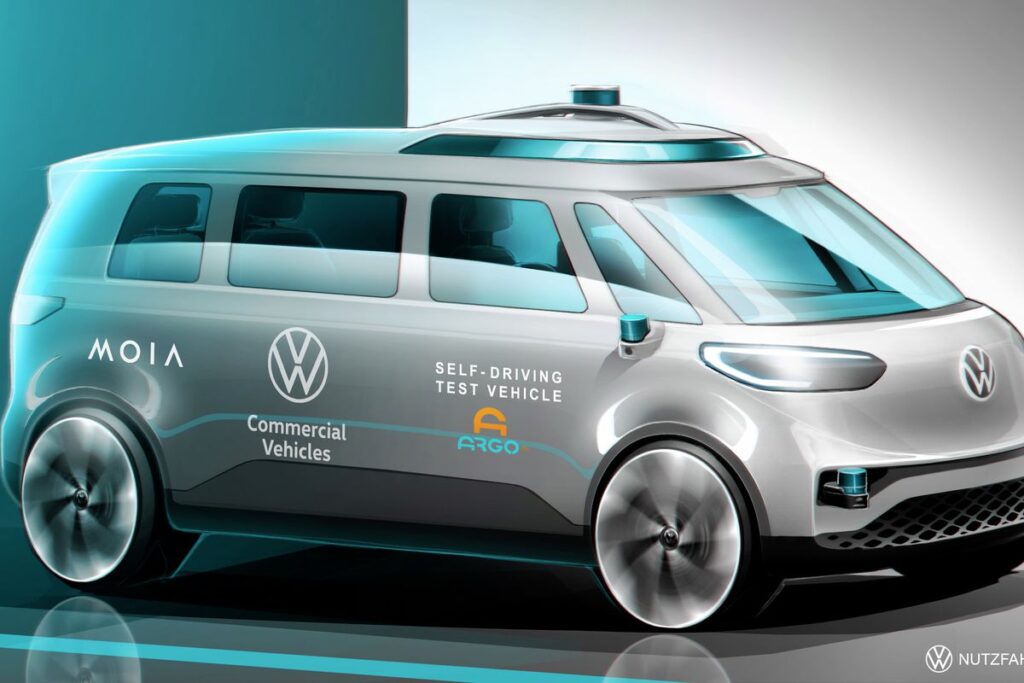In this day and age, many people are looking for a more sustainable way to commute. Car pooling is one of the most popular and convenient methods of transport, but it is not a perfect solution. As a result, car pooling has been on the rise and the next step in car pooling is to use an autonomous vehicle to solve the problems of having a vehicle for personal use. With Volkswagen’s new Argo AI, it is designed to not only help reduce CO2 emissions but also make transport easier.
Ride-pooling is expected to launch commercially in 2025
German authorities will begin testing Volkswagen’s new autonomous cars this summer. Ford and Volkswagen are backing Argo AI, a Pittsburgh startup that developed the truck’s hardware and software. German companies will be able to offer micro-transit and delivery services in 2025.

An update on the partnership between Volkswagen and Argo was provided at this week’s press conference by executives from Volkswagen and Argo, which was initially announced in 2019 as an extension of Volkswagen’s “global alliance” with Ford. Although much of what was discussed was already known, it was an interesting exploration of when Volkswagen’s cars will be used with Argo’s autonomous technology to launch a revenue-generating service.
Volkswagen ID Buzz, which is the electric version of the iconic microbus, will introduce the fifth generation of Argo’s automated driving technology, which has been tested in the US with Ford in the past few years. Argo’s CEO and founder, Bryan Salesky, praised Volkswagen’s partnership with Argo for its collaborative mindset.
An exploration of it’s timeline
In partnership with Volkswagen, we’re developing our technology in a way that sets us apart from others, Salesky said. It really puts us in a position to deliver an autonomous driving system that is safe, intelligent, and scalable.”
As of now, the project is underway. Volkswagen and Argo developed a prototype minivan earlier this year using the MEB platform from the German company inside the body of a VW T6 Transporter and Argo’s entire voice-activated technology, including the use of LIDAR sensors, radar, and cameras. Additionally, Argo’s software allows the vehicle to “see” its surroundings, predict its next step, as well as predict other vehicles’ and pedestrians’ movements. Salesky said that this can be used in conjunction with Argo’s sensor suites to provide automated driving at low and high speeds.

Moia, Volkswagen’s ride-hailing service
‘Moia’, Volkswagen’s ride-sharing company, said that the vans will be placed in service as ride-share fleets. To date, Moia has served more than 3 million customers in Hamburg with its fleet of electric vehicles. As Moia shifts to a completely autonomous fleet by 2025, the feedback these customers have provided will prove valuable.
As Henrich explained, both cities and customers have high and very specific expectations towards autonomous ride-hailing systems. Ride-sharing customers, on the other hand, expect it to be as straightforward, convenient, and reliable as taking their own car… Ride sharing will, on the other hand, relieve traffic congestion in cities.”
Since last year, many companies in the AV industry have been sold or merged with other companies. Despite long timelines and high operational costs, businesses are struggling to stay afloat despite little revenue growth in the near term. Many companies are predicting that robotaxis will be a few years away, but that is not the case. Both VW and Argo remain confident the project will be completed on time.
Volkswagen’s senior vice president for commercial vehicles, Christian Senger, said that this high-tech market still has a long way to go before it becomes a massive growth market.

Conclusion
Future technologies will also be made available to transport service providers for commercial use. The Volkswagen Group subsidiary MOIA will use the ID for self-driving cars for the first time in 2025, according to a press release. With 1200 employees, Buzz AD. MOIA is Hamburg’s largest sharing provider.
If you are wondering how the car of the future will work, the next generation may surprise you. It’s not just a futuristic story but a reality that’s beginning to show in Germany. There is a new, intelligent, smart and convenient way to get around the city – Argo AI.




